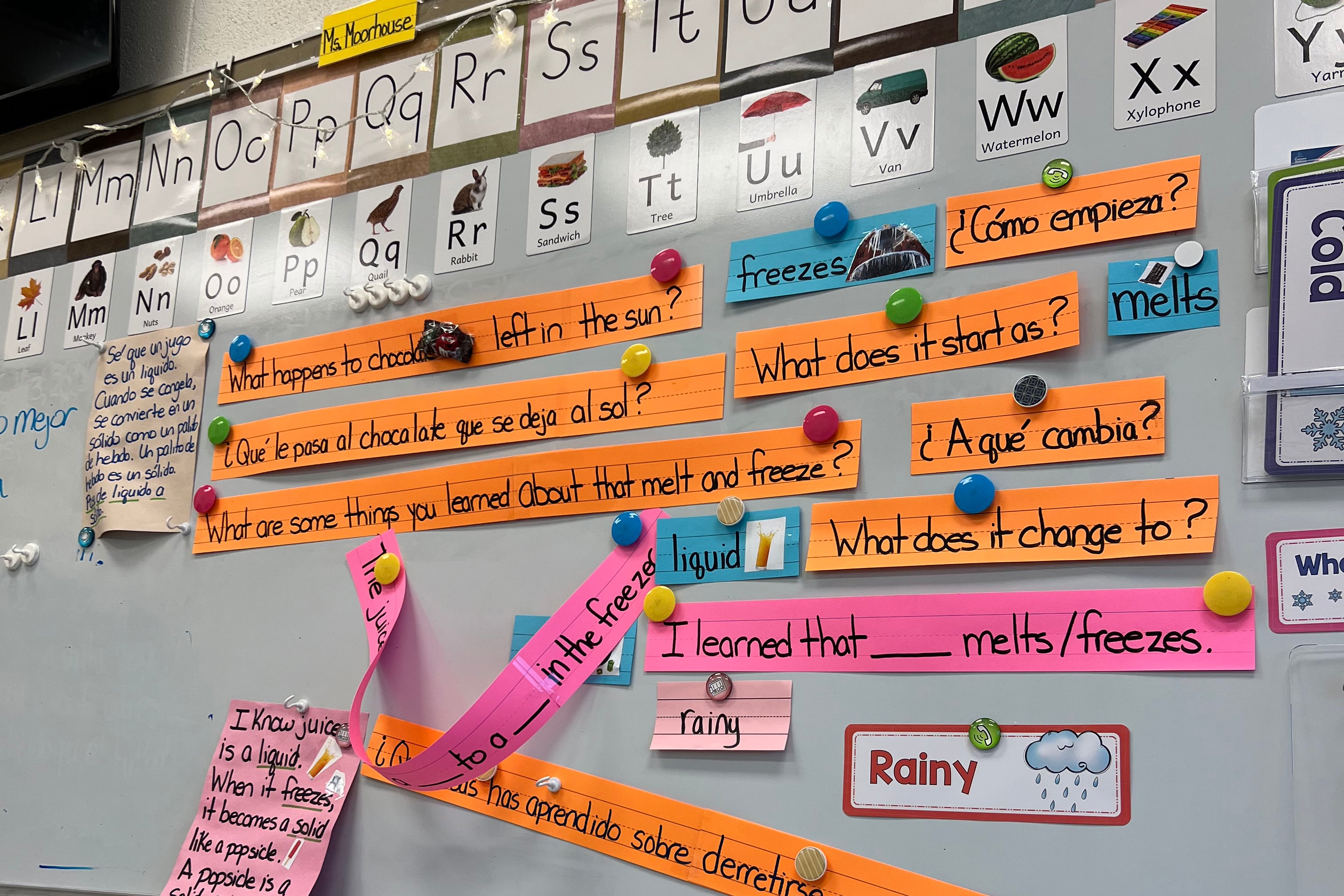Sign up for Chalkbeat Colorado’s free daily newsletter to get the latest reporting from us, plus curated news from other Colorado outlets, delivered to your inbox.
In Aurora, high school students who are learning English as a new language spend 45 minutes per day in a class specifically designed to help them improve their language skills.
But their teachers have been on their own to design the lessons that are key to helping students understand the rest of their classes with native English speakers.
After a pilot program that began last school year, Aurora Public Schools is asking the school board to approve a curriculum this month for those classes.
Almost 40% of the almost 40,000 students in Aurora Public Schools are English learners.
Alice Wilcox, one of the culturally and linguistically diverse education consultants who work with English language development teacher leaders, said teachers had been requesting a curriculum. “They wanted time to focus on instructional strategies,” Wilcox said. “It takes a lot of effort to look at the standards, create assessments and then create units. This takes the lift off of teachers.”
Statewide, Colorado high school students saw large decreases in scores from state tests taken in the spring of 2024, but students learning English had disproportionately larger decreases.
For instance, the percentage of ninth graders at or above the state’s college readiness benchmark in math fell to 40% from 47% in 2023. The state temporarily adjusted graduation requirements to account for the lower scores across high school levels.
In Aurora, the district pointed to their district-specific data showing widening gaps for English learners compared to students not learning English as a new language. Tenth graders in Aurora who are English learners had an average reading score of 320 on the PSAT test, down from 358 in 2022, while 10th graders who aren’t English learners had an average reading score of 442 this year, up from 435 in 2022.
Other Aurora data shows that high school students taking the ACCESS test, which measures English proficiency for all English learners, have shown declining growth scores. Multilingual learners are also less likely to be on track to graduate.
District leaders said the data show their English learners need more support at the high school level. Aurora started adopting curriculum materials for English language development classes in 2019, starting at the elementary level, and in 2020 adopted materials for middle schools.
In those elementary and middle schools, growth in English proficiency is above average, and at the elementary schools, proficiency is still increasing.
District leaders said they expect that providing curriculum for high school teachers should help English learners improve their language acquisition and be more successful in other classes and on tests.
The district started a pilot last year to evaluate high school materials but extended it this year to gather more data. This fall, all seven of the district’s comprehensive high schools opted in and tried the materials.
The board is being asked to approve the materials for high school from Vista Higher Learning. The materials include a program called Get Ready! for newcomers who are just starting to learn the language, and Engage, another set of materials for students who are farther along.
The district surveyed the teachers and students who tested the materials for the last few months. According to district data, 85% of 746 students who responded said the materials supported them in their other classes.
The materials for newcomers had support from 91% of teachers, while 67% of teachers were in favor of adopting the Engage curriculum.
District leaders said some teachers worried that the Engage materials were too advanced and required a big jump for students transitioning from the newcomer lessons. But leaders also said the publisher was working with the district on making some adjustments and designing training for teachers to support students in making those jumps.
Missy Winternitz, another of the district’s high school consultants, said teachers liked that the curriculum materials include content that applies to other subjects students are learning. It also helped teachers plan and collaborate with each other.
And leaders said they noticed when visiting classrooms during the pilot that students were engaged and practicing writing skills, which they said sometimes are overlooked as part of learning a language. Speaking, listening, and reading practice are also incorporated.
The curriculum for newcomers starts off with introductory language that students need right away and includes a lot of speaking practice.
As teachers continue to see large numbers of new-to-country students, Renna Martinez, a district newcomer consultant, said that teachers piloting the materials found them to be helpful even when students start mid-year.
“No matter when a student enters within this year, the curriculum really provides a good entry point to start or continue their English acquisition,” Martinez said.
District leaders said it’s also important that students feel valued and represented in the curriculum. More than 56% of the students who responded to the survey said the lessons included experiences from their culture.
“We want our students to feel really proud about being bilingual and having a rich diverse background,” said Annalee McBee, the district’s director of culturally and linguistically diverse education. “We’re a better place in this world because we have diverse thinking.”
Clarification: This story has been updated to reflect that Aurora elementary and middle school students using new English language development curriculum made above average growth in English proficiency. A previous version of the story said their English proficiency was above average.
Yesenia Robles is a reporter for Chalkbeat Colorado covering K-12 school districts and multilingual education. Contact Yesenia at yrobles@chalkbeat.org.





